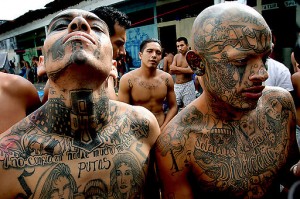Elephant Violence
Violence and bizarre aggressive behaviors among young male elephants has increased dramatically over the course of a few decades.
A team of researchers, trauma experts and neuropsychologists among them, studied the causes and found a way to resolve the elephant violence. Their findings can help us understand why we need mature men leading boys to manhood and to guide for those coming into renewed manhood following the overthrow of repressive regimes. The lessons require connecting three dots.
1. The social development systems of male elephants.
2. The abuse of women in oppressive regimes.
Pictured below is Mona Eltahawy, journalist, in Egypt, following her arrest, physical and sexual abuse by Egyptian soldiers.
3. Boy Gangs – A poor substitute for real men leading boys to manhood
Facts: The increased violence by male elephants included killing members of their own species, raping and killing rhinoceroses, and attacking humans. Intraspecies killings rose from 6% of all elephant deaths to 90% in one of the most affected areas of South Africa. The increased violence began after throngs of young males witnessed the killing of adult males. These fatherless elephants were subsequently raised by young single elephant mothers.
In Elephant Breakdown, Gay Bradshaw and her fellow researchers declared that elephant populations were suffering from chronic species-wide post traumatic stress syndrome resulting from decades of poaching and culling elephant herds. Other effects included disruptions to elephant culture and societal relations, among them the traditions by which young elephants had been raised in the wild, and by which established elephant herds were governed. Bradshaw and her fellow researchers believe this led to a collapse of elephant culture and was at the root the increased violence by, among and between elephants.
Disrupted Development
Normal development of the male elephant’s brain and culturally normative behavior relies on a second phase of socialization (beyond and after mother-nurturing) in which adult males play a critical role.
Repeat: In which adult males play a critical role.
This period and a second stage of brain reorganization also occurs in human adolescents. During this phase neural connections rearrange themselves en masse.
The Elephant Solution
When older males were re-introduced to the male herds (read gangs) the rogue adolescent males stopped engaging in hyper-aggressive behaviors and abnormally early musth cycles (periods of heightened sexual activity and hormonal shifts).
Repeat: Hyperaggressive and early periods of sexual activity (rape) both ceased.
Supervision? Role-modeling? Some believe it also had to do with the biochemical odor of adult male hormones calming the hormones of the adolescent males.
Violence and Abuse of Women in Oppressive Regimes
Moving on to dot number two:
“The best judge of whether or not a country is going to develop is how it treats its women.” President Barack Obama
Women throughout the world are subject to violence and sexual abuse, but it seems the abuse and dehumanization is greater in oppressive regimes. Like the elephants, men (and women) in these cultures observe the culling, dehumanization and poaching of the herd, and more specifically of the healthy adult males.
In November 2011, Mona Eltahawy, an Egyptian born U.S. based journalist was attacked, arrested and sexually abused by the military regime temporarily ruling the country following the overthrow of Hosni Mubarak’s oppressive Egyptian regime.
What happens when
- Fathers and would-be guides of adolescent boys are victims of oppression?
- Young boys witness the oppression, arrest, brutalization and killing of their fathers?
- Young men are then raised without male mentors during the human equivalent of musth?
Are the young men, like the elephants, more prone to violence against weaker members, women among them?
Elephant Society – Male Development
Elephants are social creatures. Young elephants are raised within an extended network of doting female caregivers that includes the birth mother, grandmothers, aunts and friends. These relations are maintained over a span of some 70 years. Young elephants stay within 15 feet of their mothers for almost all of their first eight years of life, after which young females are socialized into the matriarchal network, while young males go off for a time into an all-male social group before coming back into the fold as mature adults.
When an elephant dies, there are intense mourning and burial rituals, including vigils over the body, careful burials, caressing the bones with their trunks, If harm comes to a member of an elephant group, all the other elephants are aware of it. Elephants have an elaborate communication system. To pass along news about imminent threats or the death of a community member, they use patterns of subsonic vibrations that are felt as far as several miles away by sensors in the padding of their feet.
When these systems and rituals are disrupted, strange things happen – such as increased violence and aggressive behaviors by adolescent males who have witnessed their fathers being murdered and now have to grow up without the second and important phase of develop which takes place in all male social groups.
Men Leading Boys to Manhood
The solution among the elephants involved bringing adult males into the herd. The violence and aggressive behavior ceased.
Might this be a solution to curbing the increased violence by gangs and young men who grow up in oppressive regimes?
These boys, not-yet-men, often witness the jailing, abuse, disappearance or murder of their fathers. Social fabrics and familial networks are torn. As a result, young men are not guided through the critical second phase of development by mature evolved male social groups. (Humans, like the elephants, undergo considerable brain reorganization and growth during adolescence.)
I leave you with these questions:
What if:
- We sent adult male groups into countries that have overthrown oppressive regimes? Soldiers of civilization, so to speak.
- Adult male social networks infused at risk neighborhoods by way of Churches, YMCAs, schools, and the like?
- The Big Brother Association went global?
- You stood up to become a mentor?




